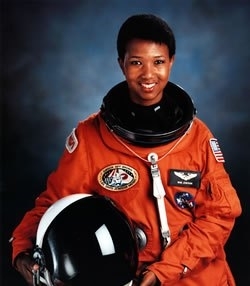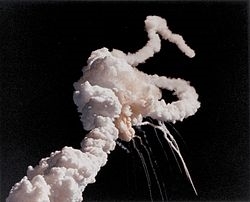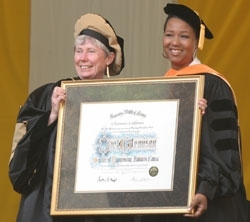 |
| Jemison joined NASA Program in 1992 (http://physicistfeminist.com/category/awesome-wome ()) |
Shoot
for the Stars and If You Miss You Will Still Hit the Moon
"We
must be the change we wish to see in the world," said Mahatma Gandhi.
Mae Jemison took this quote to heart when working towards her dreams. Mae Carol
Jemison was born to Charlie and Dorothy Jemison on October 17, 1956. Jemison
was born in Decatur, Alabama but grew up in Chicago for most of her childhood,
wanting to become a scientist since kindergarten. She grew up to become the
first woman of color in space, working for the NASA program since 1992. She
eventually left the space program and worked at Dartmouth College from 1995 to
2002 (Good). To become the change one wishes to see in this world, they must
have commitment to the change they wish to see and an ability to gain and apply
knowledge. Mae Jemison exhibits the dedication
and intelligence of a hero; she acts as an inspiration rather than a role
model.
 |
| Challenger Space Shuttle Explodes (http://en.wikipedia.org/wiki/Space_Shuttle_Challen ()) |
Jemison's dedication was leaps and
bounds ahead of that of the average person making her a hero. She showed such
extreme dedication to becoming a part of the NASA program: "After the Challenger accident, Mae
continued to work at her job with CIGNA Health Plans, but she didn't let go of
her dream of becoming an astronaut. instead
it made her more determined to succeed as an astronaut" (King). Jemison
understood that the accident, as tragic as it was, was only an accident that
could happen to any member of that mission. She assimilated awareness that a
catastrophic accident like the Challenger accident could happen to her yet
accidents like these separate those dedicated to becoming a part of the
program. Average people looking to work for NASA would have thought twice about
joining the NASA program but Jemison proved her dedication by continuing to
send her application. Also, Jemison showed her dedication since childhood: "Jemison
herself grew up with a strong sense that learning was exciting and important,
and by the time she was in kindergarten, she had already declared her ambition
to become a scientist. This was an unusual aspiration for an African American
girl in the mid-twentieth century (Good)."
Jemison was like many other children in kindergarten, aspiring to be an
astronaut, a firefighter, or a scientist. Few people have the dedication to
become what they want to be. By working hard day after day, she proved that she
was dedicated more than the average person and achieved her goal of becoming a
scientist. Also, she did not listen to the limitations others set on her
because of her race which further proved her dedication. Mae Jemison's dedication
greater than the average person helped her to become the intelligent hero she
is.
 |
| Jemison recieves Doctorate of Engineering (http://www.bulletin.hmc.edu/archives/2007/summer/c ()) |
Jemison's intelligence was greater than
that of an average person, helping her to achieve greater than the ordinary
person. Her intelligence showed in her college career: "Jemison entered Stanford University in Palo Alto,
California on a scholarship and received a Bachelor of Science degree in
chemical engineering in 1977, at the same time fulfilling the requirements for
a Bachelor of Arts in African and Afro-American studies. Jemison, building on a
career plan for biomedical engineering, went on to Cornell University Medical
College in New York, earning an M.D" (Biography Today). Jemison
achieving a degree in chemical engineering enabled her to pursue her dream of
becoming a scientist. Without such a degree, the NASA program may not have
accepted her. In order to receive this degree, she first had to engulf herself
in the subject to increase her intelligence. Her master's degree was also an
outstanding feat requiring skills that bring intelligence such as time
management, effort, and commitment, exceeding that of most ordinary people.
Also, Jemison earned two doctorates from different colleges: "Honorary Doctorate of Sciences, Lincoln
College, Pennsylvania (1991). Honorary Doctorate of Letters, Winston Salem
College, North Carolina (1991)" (Wilson). Her intelligence was further
recognized as greater than average when she received an honorary award of
science. Such an outstanding accomplishment would qualify one for these
prestigious degrees, these accomplishments being that of intelligent people
achieving greater than the masses. Jemison's intelligence was greater than the
average person's which enabled her to achieve greater than the average person. Her
dedication was what helped her to be as intelligent as she was.
Jemison's dedication and intelligence prove her a hero in achieving her dreams. She attended Stanford University, a school which requires academic excellence. Jemison's heroic intelligence is proved by her Honorary Doctorate awards and college degrees from prestigious universities, earned through dedication. Her dedication to her work is heroic. She wanted to be an astronaut even after watching one of the biggest accidents in the history of space travel. Ever since her childhood, she has been dedicated to becoming a scientist and became not only a scientist but a hero because of her dedication Jemison served as an inspiration to many such as in this quote: "I think people have to stop using the word dream, because it implies something you can't do. I like to say, 'What do you intend to do?' So, the question becomes, 'How will you do what you intend to do?'" (Jemison). She inspired people by telling them not to think of dreams as dreams but as goals. By teaching that dreams are not out of reach, she inspired me to work harder knowing that I can achieve them. Jemison made history as the first female African American astronaut. Mae Jemison made history as the first African American into space. Being a first inspired me to rethink what is possible and to work hard to be one of the few firsts of this day and age. People of her color may have not had the opportunities as others had. Her achievements showed that she reached for the stars, literally, and broke through the limits society had set on her, becoming the change in the world she wanted to see.
Works Consulted
Good,
Bonnye Busbice. "Mae C. Jemison." Great Lives From History:
African Americans (2010): 94. Biography Reference Center. Web. 10
Dec. 2012.
Jemison, Mae. "Interview with Mae." Jemison.
Scholastic, Feb. 2001. Web. 10 Dec. 2012.
King,
Coretta Scott, and LeeAnne Gelletly. "Mae Jemison." Mae Jemison
(0-7910-6293-7) (2002): 8. Biography Reference Center. Web. 10 Dec.
2012.
"Mae
Jemison." Mae Jemison (Biography Today) (2010): 1. Biography
Reference Center. Web. 10 Dec. 2012.
Wilson, Jim. "Astronaut Bio:Mae C. Jemison." Astronaut
Bio:Mae C. Jemison. NASA, 2011. Web. 10 Dec. 2012.
Page created on 1/10/2013 12:00:00 AM
Last edited 1/10/2013 12:00:00 AM
